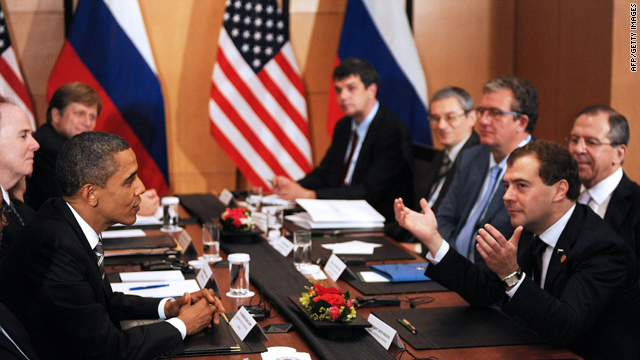Obama feels 'reasonably good' on prospects for Russian nuclear treaty

- NEW: Obama says key Republican Senators "say they want to see this done"
- U.S. Official says talks are under way to spend billions more on nuclear arsenal
- Republicans have pushed for more money to modernize the nuclear arsenal
- Presidents Obama and Medvedev discussed the New START treaty and other matters in Japan
(CNN) -- President Barack Obama on Sunday reiterated his commitment to getting the U.S. Senate to approve the New START treaty with Russia by year's end, saying he felt "reasonably good about our prospects" for the goal.
"When we look upon how important Russian support has been" on Iran sanctions and the Afghanistan supply route, Obama told reporters aboard Air Force One, "my hope is that because this is a good treaty we should get it done."
Obama spoke as he was returning from a trip to Asia, where he met with Russian President Dmitri Medvedev in Japan.
The president said the White House has had a "series of conversations" with Republican Senators John McCain of Arizona, Jon Kyl, also of Arizona, and Lindsey Graham of South Carolina about the nuclear arms treaty and that they "say they want to see this done."
On Saturday, a senior Obama administration official said that "negotiations are under way" to spend as much as $4 billion more to modernize the U.S. nuclear arsenal as part of the effort to push through the treaty by year's end.
The official's comments came after a meeting in Yokohama, Japan, between Obama and Medvedev while attending the Asia-Pacific Economic Conference.
The two leaders discussed a host of issues, from Iran to Middle East.
 Obama pushes trade at APEC summit
Obama pushes trade at APEC summit
A swift resolution to the New START treaty issue regulating the two nations' nuclear arsenals, though, ranked high on their agenda. The treaty, signed by Obama and Medvedev in April, would cut each country's deployed nuclear warheads by approximately a third, limiting each side to a maximum of 1,550.
Some Republicans have held up a vote, saying despite lengthy hearings in the last session, they have more questions about the agreement. If no action is taken, new Senate hearings would be required and that could set back ratification for as much as two years. While they didn't win a majority in the Senate, Republicans made major gains in November's election -- meaning they'll have more clout when the upcoming "lame-duck session" ends and a new Congress takes office in January.
"We have a full-court press under way right now with the key senators," said the senior administration official. "The president has made it very clear ... that this is his highest priority in terms of foreign policy pieces of business to get done in the lame duck session."
Obama has already included $80 billion over 10 years for nuclear weapons modernization in his budget, a move that experts saw as a bid to pre-empt criticism that he is not doing enough to safeguard the United States' military and nuclear strength.
But Sen. Kyl, who is leading the charge against voting on the treaty in the lame-duck session, and fellow Republicans have said they are not convinced the Obama administration is committed to modernizing the nations' nuclear arsenal or to developing and deploying a robust missile defense system.
For the New START treaty to go into effect, it must be ratified both by the U.S. Senate and by the lower house of the Russian legislature, the Duma.
The Democratic chairman of the Senate Foreign Relations Committee, John Kerry, said Wednesday he's "very hopeful" the Senate will vote in December.
The uncertainty in Washington have held up action in Moscow as well. Reacting to the midterm election, the Duma's International Affairs Committee delayed consideration by the entire Duma.
"They don't want to be caught in a situation similar to the one they were in with START II, which they ratified but the United States did not," said Sharon Squassoni, director and senior fellow of the Proliferation Prevention Program at the Center for Strategic and International Studies.
In their talks Saturday, Obama discussed with Medvedev his "legislative strategy" to getting the New START treaty ratified, and the two also talked about the political dynamic in Russia, the senior administration official said.
The two leaders also discussed the "next steps" as Russia tries to join the World Trade Organization, a move that will likely happen next year, according to the senior administration official.
Even with New START still in limbo, Medvedev and Obama discussed negotiating a new Conventional Armed Forces in Europe, or CFE, treaty. The pact, which was signed by 30 nations, sets limits for weapons and armament systems from the Atlantic Ocean to the Ural Mountains, the administration official said.
CNN's Ed Henry contributed to this report.
